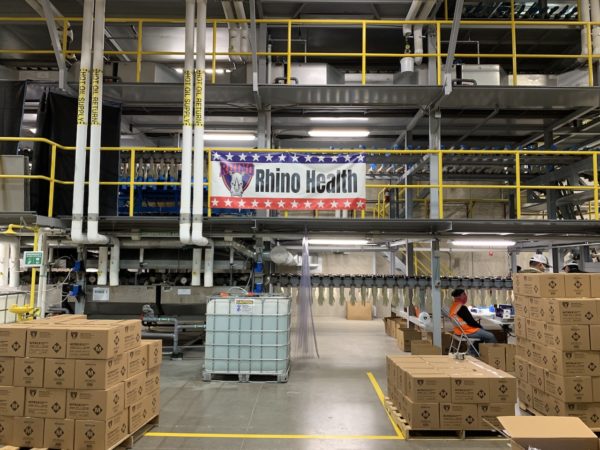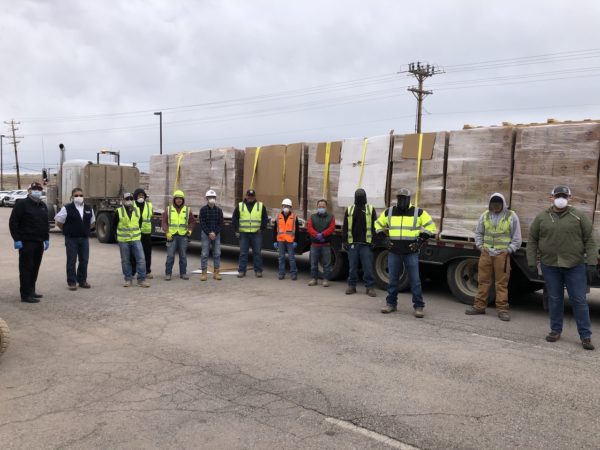
- Details
- By Native News Online Staff
WINDOW ROCK, Ariz. — If the country is in need of anything right now, it’s more medical supplies.
One of the numerous factories working hard to help meet demands is Rhino Health, LCC, a protective glove manufacturing facility based in the Navajo community of Church Rock, N.M.
The company, which produces puncture-resistant nitrile gloves (an alternative to latex), has strong ties to Navajo Nation. Last November, Navajo Nation President Jonathan Nez, Vice President Myron Lizer and the 24th Navajo Nation Council approved the appropriation of $19 million to help the company launch its operation, which created 350 new jobs in the area and also employs many Navajo workers.
With growing cases of COVID-19, President Nez said in a statement he is pleased the factory has the ability to produce millions of gloves for medical facilities in a time of need.
“This is sovereignty at the highest level,” he said. “We are practicing the teaching of our elders known as T’áá hwó’ajít’éego, or self-reliance and self-determination. We’re empowering ourselves to help our Navajo people and now we’re taking it a step further by helping people across the country as well,”
 Photo 2: President Jonathan Nez, Vice President Myron Lizer, Navajo Nation Division of Economic Development Executive Director, Rhino Health, LLC, owner Mark Lee, and workers at the glove manufacturing facility in Church Rock, N.M. on March 25, 2020.
Photo 2: President Jonathan Nez, Vice President Myron Lizer, Navajo Nation Division of Economic Development Executive Director, Rhino Health, LLC, owner Mark Lee, and workers at the glove manufacturing facility in Church Rock, N.M. on March 25, 2020.
(Courtesy photo)
In a show of support, on Wednesday, President Nez, Vice President Lizer and Navajo Nation Division of Economic Development Executive Director JT Willie joined Rhino Health owner Mark Lee as the company loaded boxes of gloves for delivery to the Navajo Nation and other parts of the country.
Of course, all employees are required to take precautions to prevent COVID-19 while working, including wearing personal protective equipment.
President Nez also said he is happy to see the company “making a huge difference for the better” for so many invaluable medical workers across the country during this pandemic.
“The funds that our Nation invested in Rhino Health, LLC, are now helping to keep our health care workers, nurses, and other first responders safe as they fight the COVID-19 coronavirus,” President Nez said. “We have many Navajo men and women working in the glove factory who are making a big difference in the lives of many whether they realize it or not.”
Meanwhile, Vice President Lizer said these are the small stories that stimulate optimism during tragic times.
“In every challenging time, you always have people and entities step up and shine,” Vice President Lizer said. “Rhino Health, LLC, as well as Navajo enterprises, small businesses, and others are stepping up and helping to fight and beat the pandemic. These are the stories of hope and inspiration that need to be told in times like this.”
More Stories Like This
American Basketball Association Announces Native ABA InitiativeFour Winds South Bend Upgrades to Class III Gaming Casino
Native News Online Wins Two Awards from Native American Journalists Association
Wahlberg Brothers Are a Big Hit at Indian Gaming Tradeshow and Convention in Las Vegas
Native Gro Offers Tribes a ‘One-Stop Shop’ for Entering the Cannabis Industry
Help us defend tribal sovereignty.
At Native News Online, our mission is rooted in telling the stories that strengthen sovereignty and uplift Indigenous voices — not just at year’s end, but every single day.
Because of your generosity last year, we were able to keep our reporters on the ground in tribal communities, at national gatherings and in the halls of Congress — covering the issues that matter most to Indian Country: sovereignty, culture, education, health and economic opportunity.
That support sustained us through a tough year in 2025. Now, as we look to the year ahead, we need your help right now to ensure warrior journalism remains strong — reporting that defends tribal sovereignty, amplifies Native truth, and holds power accountable.
 The stakes couldn't be higher. Your support keeps Native voices heard, Native stories told and Native sovereignty defended.
The stakes couldn't be higher. Your support keeps Native voices heard, Native stories told and Native sovereignty defended.
Stand with Warrior Journalism today.
Levi Rickert (Potawatomi), Editor & Publisher

